'White people's party' dominates mid-term congressional elections
By Askia Muhammad -Senior Editor- | Last updated: Nov 11, 2014 - 3:43:27 PMWhat's your opinion on this article?
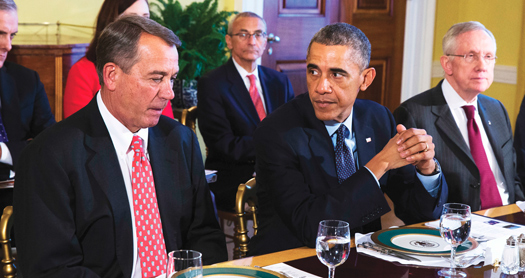
President Barack Obama meets with Congressional leaders in the Old Family Dining Room of the White House in Washington, Nov. 7. From left are, House Speaker John Boehner of Ohio, Obama, and Senate Majority Leader Harry Reid of Nev. Photo: AP/Wide World photos
|
WASHINGTON (FinalCall.com) - The final two years of President Barack Obama’s term in office will be the most difficult yet, after voters—in mostly Conservative-leaning states in mid-term elections Nov. 4—handed control of the U.S. Senate, and an even firmer margin in the House of Representatives to the bellicose, anti-Obama anti-Washington, anti-government, pro-Tea Party-sympathizing wing of the Republican Party.

Supporters celebrate as Georgia Republican U.S. Senate candidate David Perdue is announced the winner at his election night party, Nov. 4, in Atlanta.
|
Despite the historic trend for a sitting U.S. president’s party to invariably lose congressional seats in the sixth year of his term, there was ample evidence that this year’s GOP success was aided by racial hatred of the first Black President, which seemed to “spill over (the electorate) like a tsunami,” in the words of one social media commentator.
President Obama—who left the country five days after the elections for a weeklong trip to Asia, visiting China, Myanmar and Australia—promised before he left, to continue to reach out to the GOP, in words and action. “I’m eager to work with the new Congress to make the next two years as productive as possible,” Mr. Obama said in a press conference one day after the extent of his party’s defeat was clear.
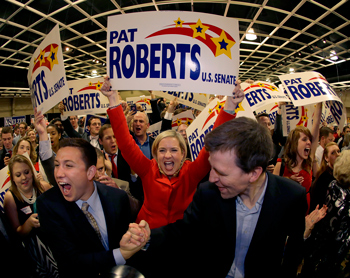
Supporters cheer before Kansas Sen. Pat Roberts makes his victory speech during a Republican watch
party, Nov. 4, in Topeka, Kan.
|
In contest after contest, incumbent Democrats and Democrat candidates in open Senate seats formerly held by retiring members of their party in states won by 2012 Republican presidential nominee Mitt Romney, or narrowly won by Mr. Obama, Democratic Senate candidates campaigned as, “I’m not President Obama, I’m as far from him as I can be,” this according to, of all people, former Massachusetts Gov. Mitt Romney, in a speech after the election.
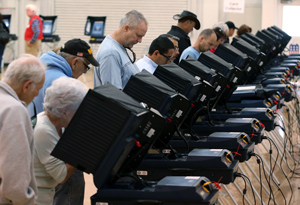
Voters cast their ballots in Carson City, NV, on Nov. 4.
|
In exit polls, so-called “angry voters” complained about everything except that this president is a Black man. They cited joblessness and the economy, but the fact of the matter is that the jobless rate in October fell to 5.8 percent, the lowest rate since 2008, when George W. Bush was president, the Labor Department announced Nov. 7. In October the economy added 214,000 new jobs. That’s the ninth consecutive month that more than 200,000 jobs were added. The last time that milestone was reached was in 1995.
The share of working Americans now stands at 59.2 percent, which is the highest level since July 2009. The U.S. economy expanded over the last six months at its sharpest pace since 2003. Jason Furman, chairman of the White House’s Council of Economic Advisers, described the 56 straight months of job growth under President Obama as “the longest streak on record” and noted that private employment has grown by 2.6 million over the last year.
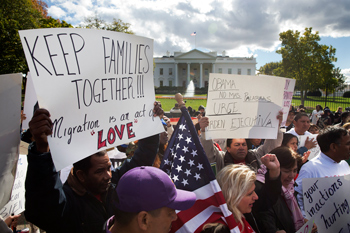
People rally for comprehensive immigration reform, Nov. 7, outside the White House in Washington. After the midterm elections immigration groups are pushing for executive action.
|
Gasoline is selling for under $3 a gallon nationally, for the first time in several years. The stock market is at a record level—the Dow Jones average was 7,949 when Pres. Obama took office, it’s above 17,000 today. The federal deficit has been cut in half, and yet the GOP compared the Black President to Hitler, and many White voters believed it, voting against Mr. Obama, and against their own best interests, some analysts insist.
Mr. Romney said with his “kid gloves” on, what many others were whispering among themselves. But race spilled over into the dialogue when a self-identified Republican on a C-SPAN after-election call in show, said bluntly, and what folks in barbershops and beauty parlors suspected all along.
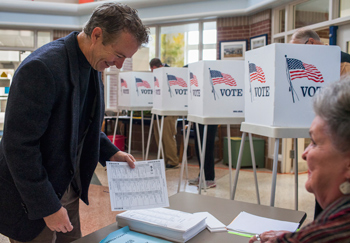
U.S. Sen. Rand Paul, R-Ky., laughs as he asks for reading glasses before voting at Briarwood Elementary School in Bowling Green, Ky., on Election Day, Nov. 4.
|
Liberal observers are not so quick to blame President Obama, or to attribute the national referendum entirely to race. “I know it’s being interpreted as a wave election,” political analyst and statistician Dr. David Bositis told The Final Call, “and in places where things broke late, they certainly broke in favor of Republicans. But on the other hand, this wasn’t a national election. The playing field for this election was primarily White states, and Southern states.
“The Republicans are the White people’s party, and in the South, everything is very, very racially polarized. So, it’s not a surprise,” Dr. Bositis continued. “This was not a referendum on President Obama. In the sixth year of a president’s term there is always a tendency to attribute everything to the president. There certainly was a significant amount of racial hatred in a number of states.” But race hatred was not the only factor, he insisted.
For his part the president shouldered much of the blame. He and his White House team did not succeeded in effectively selling the benefits of his policies to the American people. “It’s not enough just to build a better mousetrap,” Mr. Obama said in an interview that was taped at the White House before his departure for Asia, and broadcast Nov. 9 on the 60th anniversary of CBS’s “Face the Nation” program. “People don’t automatically come beating to your door. We’ve got to sell it. We’ve got to reach out to the other side and, where possible, persuade.”
Mr. Obama acknowledged bluntly that “we got beat” in the elections and said that the Democratic losses prompted him to have a “gut check” about what he needs to do differently. “There are times, there’s no doubt about it, where, you know I think we have not been successful in going out there and letting people know what it is that we’re trying to do and why this is the right direction,” the president said.
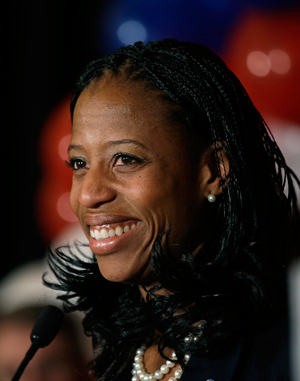
Republican Mia Love celebrates with her supporters after winning the race for Utah's 4th Congressional District during the Utah State GOP election night watch party, Nov. 4, in Salt Lake City. Love becomes the first Black female Republican elected to Congress.
|
But as he has in the past, he defended the merits of his administration’s policies, blaming the election results on a poor communications effort in the White House.
Liberal economist Paul Krugman—also declined to play the “race card” in his post election analysis. “Politics determines who has the power, not who has the truth,” Mr. Krugman said in a statement published Nov. 6. “Still, it’s not often that a party that is so wrong about so much does as well as the Republicans did on Tuesday.”
The next election cycle may be entirely different than this time around, Dr. Bositis predicted. “On the other hand, the 2016 election will be entirely different. Whereas turnout in this election, was in the low 40s (percentage of eligible voters), turnout in that election will be in the 60s. So, there will be 50 percent more voters, and the more voters there are, the more people of color and young people will be voting. Plus, this was a Republican terrain this time around. Next time around it’s going to be a Democratic terrain,” where senators will be chosen. Indeed, he forecast, there will even be 2 percent fewer White voters in the overall pool in 2016.
In addition, despite complaints by some who suggested that the lack of Black voter turnout is the reason Democrats lost key races, the percentage of Black voter turnout of the total votes cast was up by 20 percent, from 10 percent of the total in 2010, to 12 percent of the total in 2014, Dr. Bositis said.
“The Tea Party, the senators who were elected in 2010—in the mid-term, that was the Tea Party wave election—those people are going to be up for election in a presidential year, and many of those people were elected in Blue States,” Dr. Bositis continued. On top of that, “Republicans control Congress now. They’re going to be responsible (for the outcome of government decisions) as much as (President) Obama,” next time around.
That business of governing, the president told the congressional leaders in their meeting, includes three areas he set forth where he and Congress can work together immediately, according to a statement from the White House.
“First, Congress can act now to support the request for emergency funding to combat Ebola abroad and increase our preparedness at home. Second, the president urged the leaders to pass a budget for the rest of the fiscal year in the same bipartisan, drama-free way they did earlier this year because there is no reason to create uncertainty for businesses that are putting Americans back to work.
“Finally, (Defense) Secretary (Chuck) Hagel, (Office of Management and Budge [OMB]) Director Donovan and General (Lloyd) Austin (Commander of U.S. Central Command) briefed the Members on the Administration’s ongoing efforts to confront the threat posed by ISIL and requested that Congress provide $5.6 billion in additional resources in FY15 to support the counter-ISIL strategy. General Austin also briefed the Leadership on an expansion of our effort to train and assist Iraqi Security Forces.”
There will also be a record number of Black faces in Congress, and a record of 101 women in Congress next year. Two Black Republicans were elected to the House: Mia Love, the former mayor of Saratoga Springs, Utah and the daughter of Haitian immigrants won an open House seat in that state; and Will Hurd, a 37-year-old former CIA undercover operative narrowly defeated a Democratic incumbent in Texas.
A third Republican—Sen. Tim Scott (R-S.C.) who became the first Black senator elected since Reconstruction—won the seat to which he was appointed two years ago by GOP Gov. Nikki Haley. And Democratic Sen. Corey Booker (D-N.J.) won a full term this time around for the seat he has held. There will be 46 members serving in the Congressional Black Caucus; along with the three GOP members who are not expected join their Black colleagues in the CBC.
INSIDE STORIES AND REVIEWS
-
-
About Harriett ... and the Negro Hollywood Road Show
By Rabiah Muhammad, Guest Columnist » Full Story -
Skepticism greets Jay-Z, NFL talk of inspiring change
By Bryan 18X Crawford and Richard B. Muhammad The Final Call Newspaper @TheFinalCall » Full Story -
The painful problem of Black girls and suicide
By Charlene Muhammad -National Correspondent- » Full Story -
Exploitation of Innocence - Report: Perceptions, policies hurting Black girls
By Charlene Muhammad -National Correspondent- » Full Story -
Big Ballin: Big ideas fuel a father’s Big Baller Brand and brash business sense
By Bryan Crawford -Contributing Writer- » Full Story






 Click Here Stay Connected!
Click Here Stay Connected!








